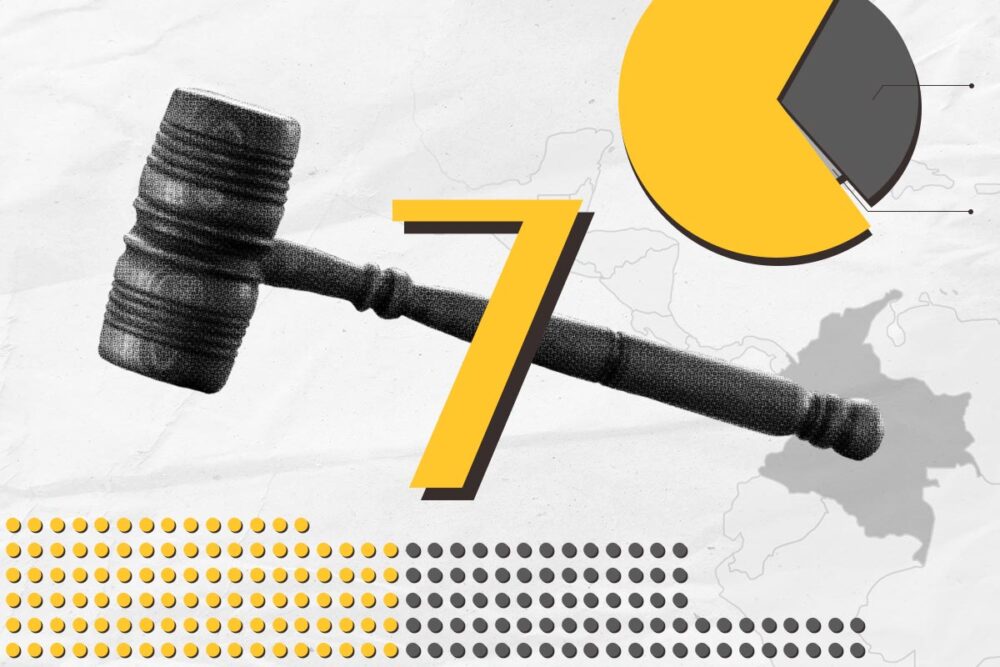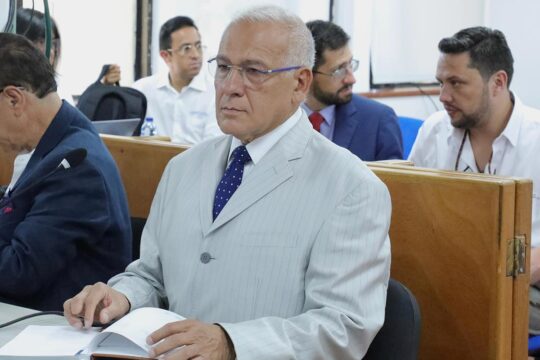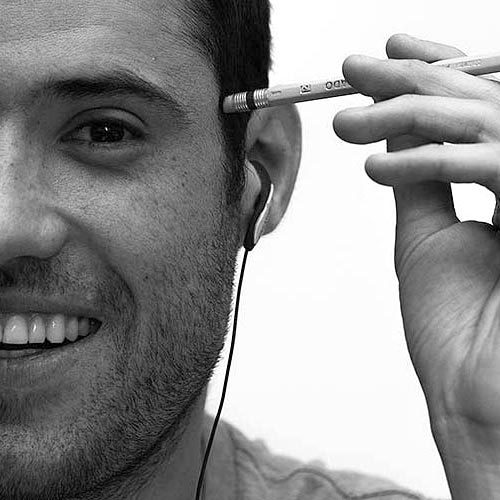Seven years since the Special Jurisdiction for Peace (JEP) opened its doors and four years since it unveiled its first indictment, what is the balance of the work carried out by the judicial arm of the innovative transitional justice system that Colombia created after its 2016 peace agreement?
Its wager is a model where those accused of having been most responsible for atrocious crimes during the country’s 52-year-long armed conflict choose to acknowledge their role, provide truth and directly redress their victims. This allows them to receive more lenient 5-to-8 sentences in a non-prison environment. If they choose not to accept the charges, they go to an adversarial track and, if found guilty at trial, are sentenced to up to 20 years in prison.
A glance at the JEP’s numbers reveals a paradox about the Colombian model of transitional justice.
On the brighter side, the Acknowledgment Chamber has made great strides in investigating those most responsible for war crimes and crimes against humanity in Colombia, indicting 251 people to date. One third of the accused are former rebels of the Revolutionary Armed Forces of Colombia (FARC) and two thirds are former members of the Colombian Army. Nine out of ten defendants have chosen to acknowledge their crimes, according to Justice Info’s count.
But there are some shadows in the JEP’s work that could undermine its legitimacy in the long run. There is not a single top perpetrator sentenced yet. This is despite the high number of indictees, the fact that most of them have already accepted the charges against them, and the fact that since late 2022 three definitive group indictments have been filed (what the JEP calls ‘resolutions of conclusions’). Of the 20 indictees who have refused to accept the charges, only five have been accused by the tribunal’s prosecutor's office, the Investigation and Indictment Unit (UIA). Only one, Colonel Hernán Mejía, is currently on trial. Decisions on the thousands of other persons potentially involved in those crimes, but not deemed most responsible, advance slowly. And there is still no news on what exactly the sanctions for those who opt for the novel path of acknowledging their responsibility will be.
How the investigation, trial and sanction process is going in Colombia
Below, Justice Info provides you with a visual and quantified summary. All the data (finalised in July 2025) is also reproduced further down this page in text.
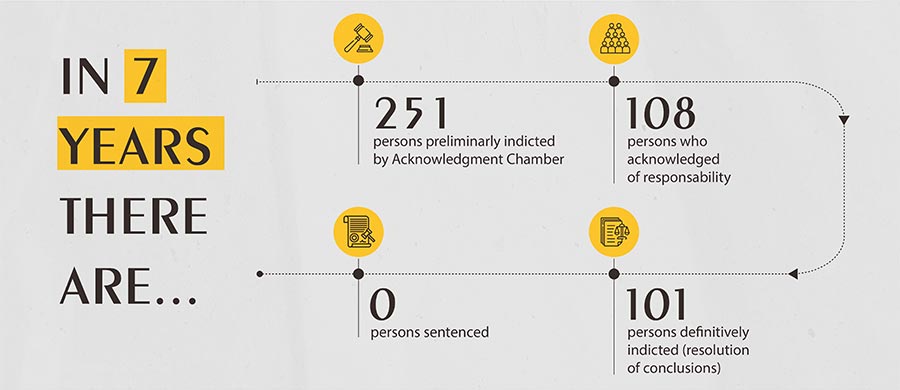
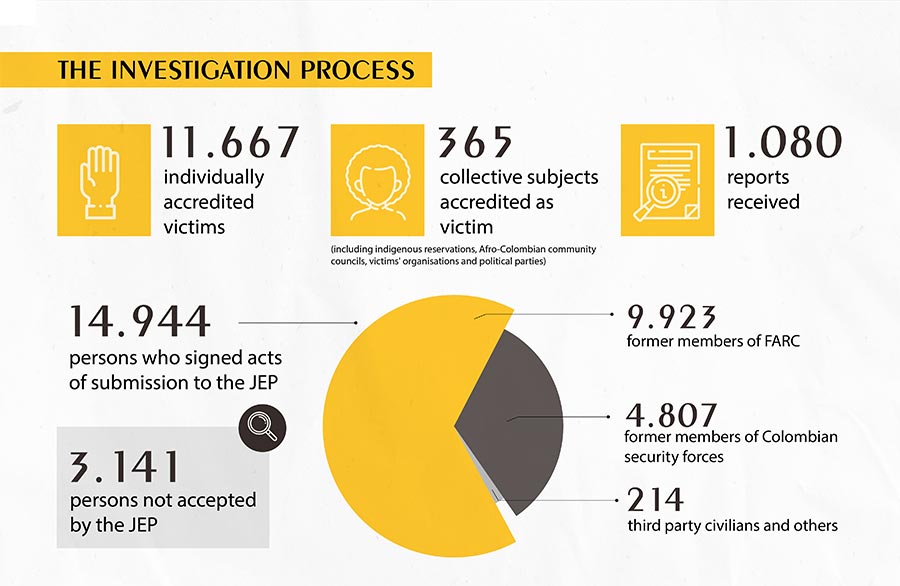
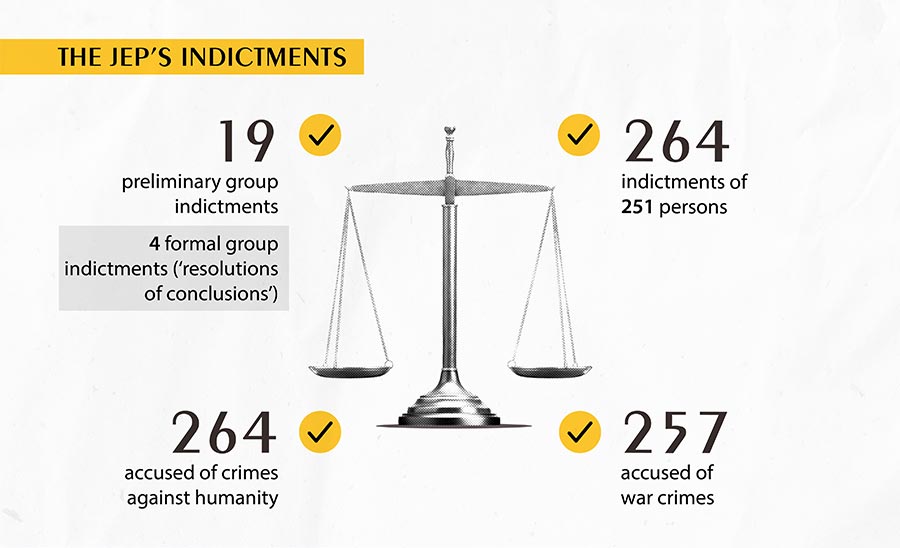
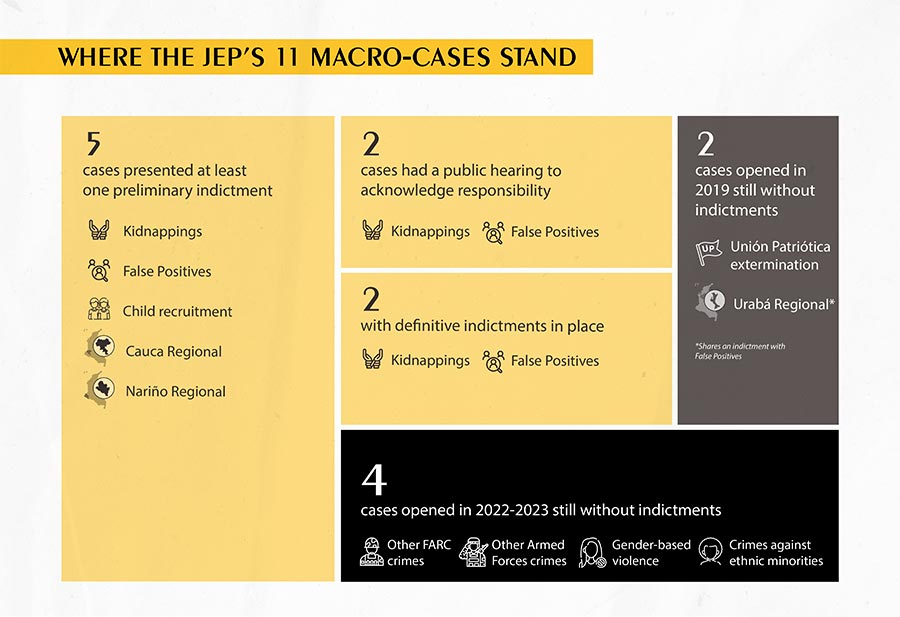
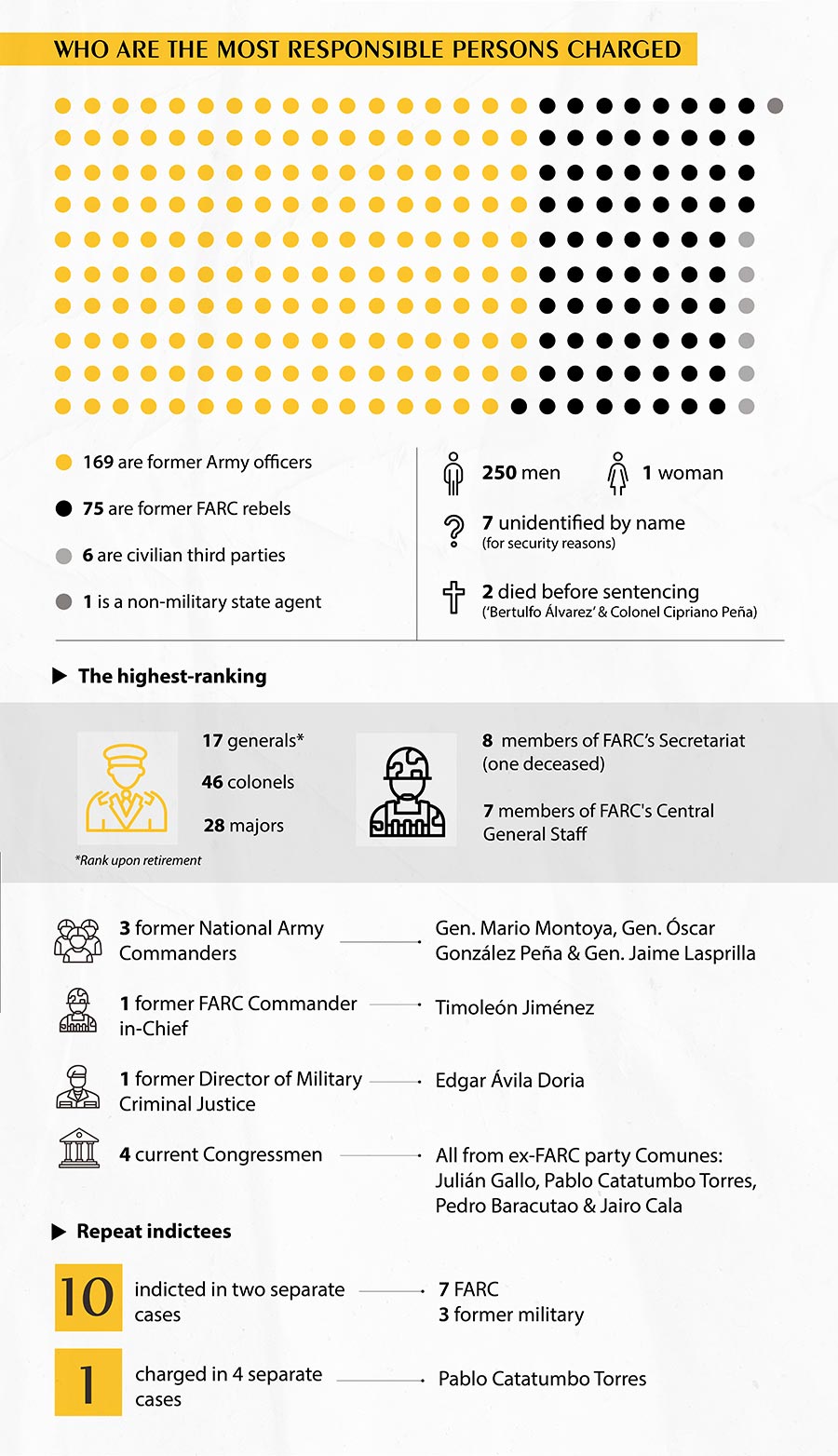
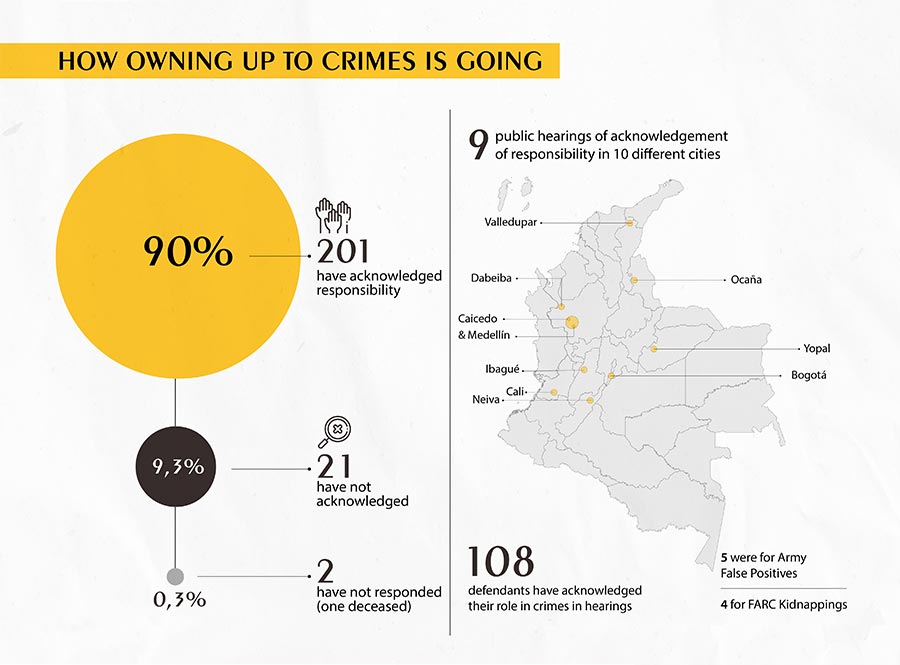
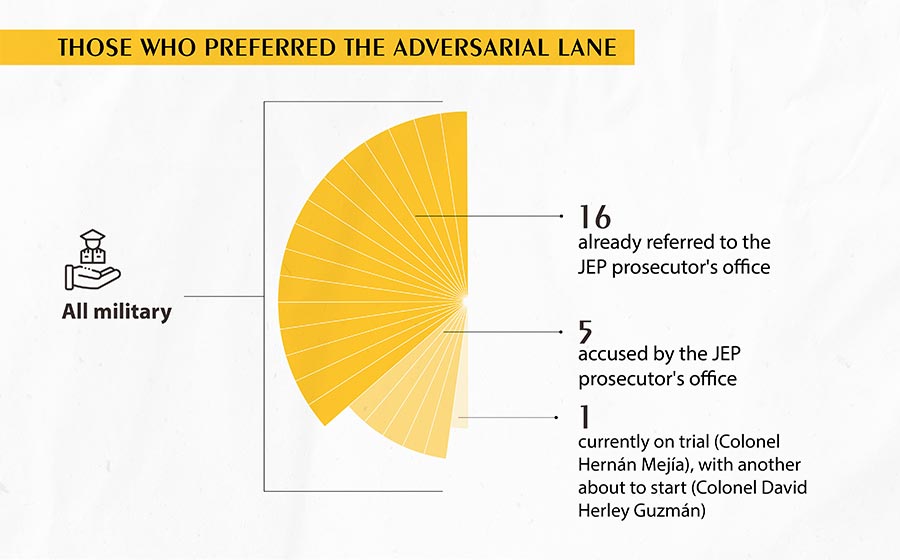
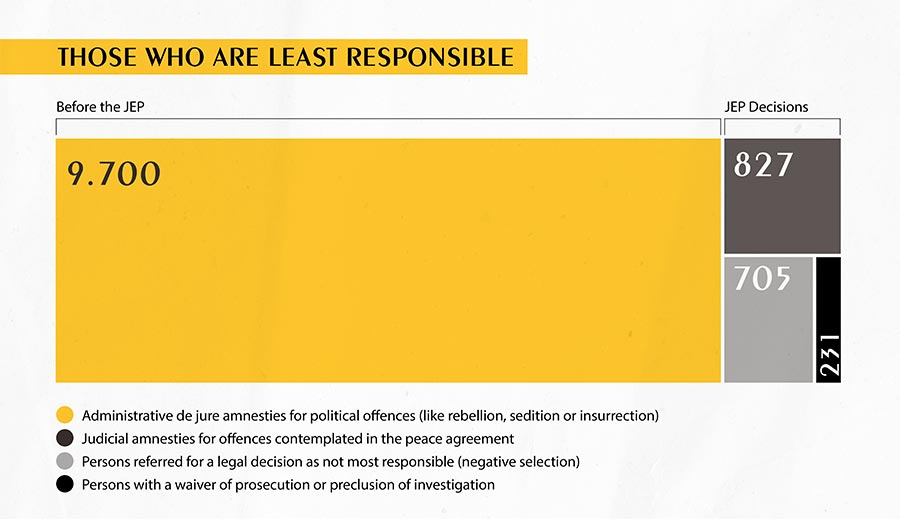

Below is a text version of our data.
After 7 years, the JEP has…
251 persons preliminarly indicted by Acknowledgement Chamber
108 persons who acknowledged responsibility in public hearing
101 persons definitively indicted (resolution of conclusions)
0 persons sentenced
The investigation process
11,667 individually accredited victims
365 collective subjects accredited as victims (including indigenous reservations, Afro-Colombian community councils, victims' organisations and political parties)
1,080 reports received
14,944 persons who signed acts of submission to the JEP
9,923 former members of FARC
4,807 former members of Colombian security forces
214 third party civilians and others
3,141 persons not accepted by the JEP
The JEP’s indictments
19 preliminary group indictments
4 formal group indictments (‘resolutions of conclusions’)
264 indictments of 251 persons
264 accused of crimes against humanity
257 accused of war crimes
Where the JEP’s 11 macro-cases stand
5 cases presented at least one preliminary indictment (kidnappings, false positives, child recruitment, Cauca region, Nariño region)
2 cases had a public hearing to acknowledge responsibility (kidnappings, false positives)
2 cases with definitive indictments in place (kidnappings, false positives)
2 cases opened in 2019 still without indictments (Unión Patriótica extermination, Urabá region*)
4 open cases in 2022-2023 still without indictments (other FARC crimes, other Armed Forces crimes, crimes against ethnic minorities and gender-based violence)
*Shares an indictment with false positives
Who are the most responsible persons charged
169 are former Army officers
75 are former FARC rebels
6 are civilian third parties
1 is a non-military state agent
250 men, 1 woman
7 unidentified by name (for security reasons)
2 died before sentencing ('Bertulfo Álvarez' & Colonel Cipriano Peña)
The highest-ranking
17 generals, 46 colonels, 28 majors (rank at retirement)
8 members of FARC’s Secretariat (one deceased), 7 members of FARC's Central General Staff
3 former National Army Commanders (Gen. Mario Montoya, Gen. Óscar González Peña & Gen. Jaime Lasprilla)
1 former FARC Commander-in-Chief (Timoleón Jiménez)
1 former Director of Military Criminal Justice (Edgar Ávila Doria)
4 current Congressmen (all from ex-FARC party Comunes) - Julián Gallo, Pablo Catatumbo Torres, Pedro Baracutao & Jairo Cala
Repeat indictees
10 indicted in two separate cases (7 FARC, 3 former military)
1 charged in 4 separate cases (Pablo Catatumbo Torres)
How owning up to crimes is going
201 have acknowledged responsibility (90% of total)
21 have not acknowledged (9.3% of total)
2 have not responded (one deceased)
9 public hearings of acknowledgement of responsibility
in 10 different cities
5 were for Army false positives, 4 for FARC kidnappings
108 defendants have acknowledged their role in crimes in hearings
Those who preferred the adversarial lane
All of them military
16 already referred to the JEP prosecutor's office
5 accused by the JEP prosecutor's office
1 currently on trial (Colonel Hernán Mejía), with another about to start (Colonel David Herley Guzmán)
Those who are least responsible
Before the JEP
9,700 administrative de jure amnesties for political offences (like rebellion, sedition or insurrection)
JEP’s decisions
827 judicial amnesties for offences contemplated in the peace agreement
705 persons referred for a legal decision as not most responsible (negative selection)
231 persons with a waiver of prosecution or preclusion of investigation
Most responsible persons sanctioned
0
The first two public hearings to verify that the accused have complied with acknowledgment, truth and redress conditions is planned to be held in July of this year.
Sources: JEP indictments, reports and public statements analysed by Justice Info, plus own reporting.
Infographics: Maryann Estrada


